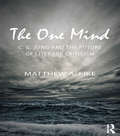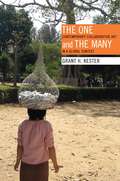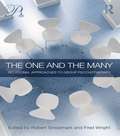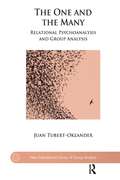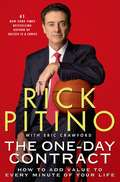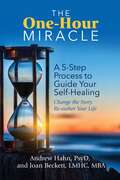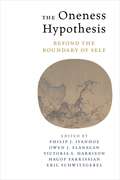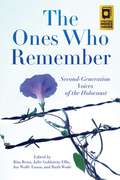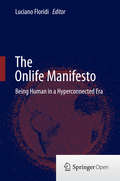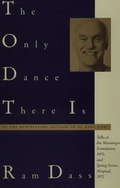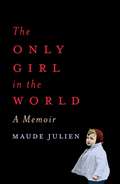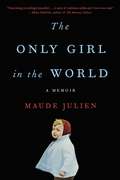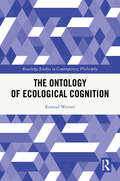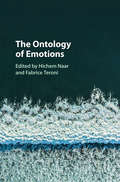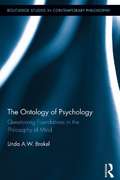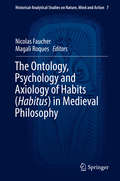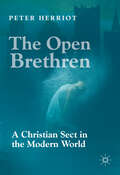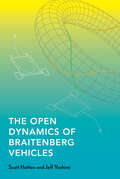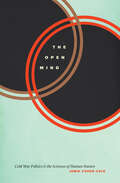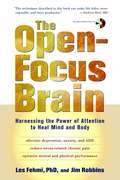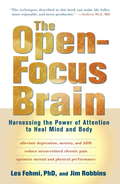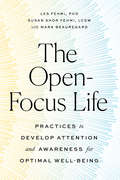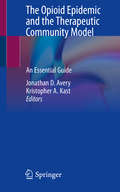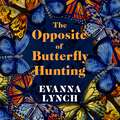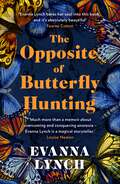- Table View
- List View
The One Mind: C. G. Jung and the future of literary criticism
by Matthew A. FikeThe One Mind: C. G. Jung and the Future of Literary Criticism explores the implications of C. G. Jung's unus mundus by applying his writings on the metaphysical, the paranormal, and the quantum to literature. As Jung knew, everything is connected because of its participation in universal consciousness, which encompasses all that is, including the collective unconscious. Matthew A. Fike argues that this principle of unity enables an approach in which psychic functioning is both a subject and a means of discovery—psi phenomena evoke the connections among the physical world, the psyche, and the spiritual realm. Applying the tools of Jungian literary criticism in new ways by expanding their scope and methodology, Fike discusses the works of Hawthorne, Milton, Shakespeare, Wordsworth, and lesser-known writers in terms of issues from psychology, parapsychology, and physics. Topics include the case for monism over materialism, altered states of consciousness, types of psychic functioning, UFOs, synchronicity, and space-time relativity. The One Mind examines Goodman Brown's dream, Adam's vision in Paradise Lost, the dream sequence in "The Wanderer," the role of metaphor in Robert A. Monroe's metaphysical trilogy, Orfeo Angelucci's work on UFOs, and the stolen boat episode in Wordsworth's The Prelude. The book concludes with case studies on Robert Jordan and William Blake. Considered together, these readings bring us a significant step closer to a unity of psychology, science, and spirituality. The One Mind illustrates how Jung's writings contain the seeds of the future of literary criticism. Reaching beyond archetypal criticism and postmodern theoretical approaches to Jung, Fike proposes a new school of Jungian literary criticism based on the unitary world that underpins the collective unconscious. This book will appeal to scholars of C. G. Jung as well as students and readers with an interest in psychoanalysis, literature, literary theory, and the history of ideas.
The One and the Many: Contemporary Collaborative Art in a Global Context
by Grant H. KesterCollaborative and collective art practices have proliferated around the world over the past fifteen years. In The One and the Many, Grant H. Kester provides an overview of the broader continuum of collaborative art, ranging from the work of artists and groups widely celebrated in the mainstream art world, such as Thomas Hirschhorn, Superflex, Francis Als, and Santiago Sierra, to the less-publicized projects of groups, such as Park Fiction in Hamburg, Networking and Initiatives for Culture and the Arts in Myanmar, Ala Plastica in Argentina, Huit Facettes in Senegal, and Dialogue in central India. The work of these groups often overlaps with the activities of NGOs, activists, and urban planners. Kester argues that these parallels are symptomatic of an important transition in contemporary art practice, as conventional notions of aesthetic autonomy are being redefined and renegotiated. He describes a shift from a concept of art as something envisioned beforehand by the artist and placed before the viewer, to the concept of art as a process of reciprocal creative labor. The One and the Many presents a critical framework that addresses the new forms of agency and identity mobilized by the process of collaborative production.
The One and the Many: Relational Approaches to Group Psychotherapy (Psychoanalysis in a New Key Book Series)
by Robert Grossmark Fred WrightThe One and the Many: Relational Approaches to Group Psychotherapy applies advances in relational psychoanalysis to the theory and practice of group psychotherapy. In this volume Robert Grossmark and Fred Wright bring together leading writers in the group psychotherapy field, both psychoanalysts and group therapists, who have integrated ideas from contemporary relational psychoanalysis. Together, they constitute a vibrant and dynamic new wave in group psychotherapy and psychoanalysis that challenge much accepted wisdom and practice in the field, including classic group psychotherapy ideas regarding the therapist’s role, the group-as-a-whole and unconscious processes in group. In this book, Grossmark and Wright show how the development of relational psychoanalysis has had a transformative impact on the field of psychoanalysis that has reverberated in the group psychotherapy world. The contributors illustrate how the broadening scope of the contemporary relational scene offers much that coheres with and amplifies the theory and practice of group treatment. The focus on dissociation, enactment, trauma, mutuality and intersubjectivity in the clinical setting, the foregrounding of sub-symbolic communication and implicit relational knowing, the registration of mutual containment and mutual regulation, all open new and exciting vistas for understanding the process and healing properties of group treatment. The One and The Many expands the theory and practice of group psychotherapy offering innovative and refreshing ways to understand group interaction and to formulate interventions in both large and small groups. This book will be of interest and practical help to all who practice group psychotherapy, group process, psychoanalysis and psychotherapy in general, including all mental health practitioners, psychoanalysts, psychotherapists, psychiatrists, social workers, counsellors and pastoral counsellors.
The One and the Many: Relational Psychoanalysis and Group Analysis (The New International Library of Group Analysis)
by Juan Tubert-OklanderThis book presents a selection of papers on the subjects of Relational Analysis and Group Analysis, written in the ten-year period that goes from 2002 to 2012. It deals with the problems of interpretation from the hermeneutic, psychoanalytic, and group-analytic points of view.
The One-Day Contract: How to Add Value to Every Minute of Your Life
by Rick Pitino Eric CrawfordA life-changing guide to achieving your goals, by the 2013 NCAA champion college basketball coach and #1 New York Times bestselling author. Rick Pitino is famous as one of the most dynamic and successful basketball coaches of our time, leading the University of Louisville Cardinals to the NCAA basketball championship in 2013, and is renowned for writing the #1 New York Times bestselling success and leadership book, Success is a Choice. In his new book, The One-Day Contract, Pitino details his key to success, on the court and in life: to focus on making the most of each day, by creating a contract with yourself. Coach Pitino was able to turn Louisville into NCAA champions by applying this idea to everything he and the team did--every practice, every recruiting visit, every game preparation, every scouting report, every instruction that he gave players and coaches, and everything he did himself. Each day became just as important as reaching the national championship, and so, by honoring the one-day contract, he and Louisville moved through adversity toward their goal. In this inspiring and practical guide, Coach Rick Pitino illustrates how to set your own one-day contract, and follow through to honor it for each day, each goal, and each interaction with another person. Pitino shows how to: Establish focus as a discipline in everything you do: planning, strategy, priorities, and career advancement. Discover the true key to success: not ambition, not wealth, not power, but humility. Use technology wisely--but don't let it replace personal connection with the people you work and live with. Own up to your problems, tell the truth and they will become part of your past. Lie and they become part of your future. Make small changes and add value to every minute of your life. The One-Day Contract will reshape the way you approach your job, your goals, and your life.
The One-Hour Miracle: A 5-Step Process to Guide Your Self-Healing: Change the Story, Re-author Your Life
by Andrew Hahn Joan BeckettA revolutionary healing framework that is a blueprint for transforming most problems, ranging from the most pedestrian to the most treatment resistant. And sometimes, the transformation simply takes one hour.The One-Hour Miracle: A 5-Step Process to Guide Your Self-Healing presents the revolutionary Life-Centered Therapy (LCT), a healing framework that is a blueprint for transforming most problems--physical (such as chronic pain, asthma, addictions), emtional and mental (including depresssion, PTSD, OCD, paranoia) relational (releasing destructive patterns), and spiritual (alienation, despair, inertia), And sometimes, the transformation simply takes one hour. Filled with testimonials of real-life people who have benefitted from this approach when other attempts to end their suffering turned up fruitless, it provides people with an entirely new way of understanding their suffering, giving them inspiration and hope that they can create miracles in their lives. The One-Hour Miracle includes a protocol that allows people to facilitate this process on their own by finding the root cause of their suffering and shifting it. This framework helps them live engaged lives of freedom, peace, joy, wisdom, and vitality. In the book, co-authors Andrew Hahn, PsyD, and Joan Beckett, LMHC, will teach readers how to do this work for themselves and others. With step-by-step instructions, readers are led through a five-step process, an integration of mindfulness and body-centered therapy, that guides them through their own self-healing practices and how to do them. In addition, therapists who are reading the book will have enough information to immediately start using the approach with clients without needing more training
The Oneness Hypothesis: Beyond the Boundary of Self
by Stephen R. Clark Michael R. Slater Mark Unno Jay L. Garfield Lawrence Blum Tao Jiang Justin Tiwald Victoria Harrison Eva Feder Kittay Donald L. Baxter Bradford Cokelet Kendy M. Hess Cho Geung Ho Shaun Nichols Dimitri Putilin Nina Strohminger William B. Swann Jr. Sanaz TalaifarThe idea that the self is inextricably intertwined with the rest of the world—the “oneness hypothesis”—can be found in many of the world’s philosophical and religious traditions. Oneness provides ways to imagine and achieve a more expansive conception of the self as fundamentally connected with other people, creatures, and things. Such views present profound challenges to Western hyperindividualism and its excessive concern with self-interest and tendency toward self-centered behavior.This anthology presents a wide-ranging, interdisciplinary exploration of the nature and implications of the oneness hypothesis. While fundamentally inspired by East and South Asian traditions, in which such a view is often critical to their philosophical approach, this collection also draws upon religious studies, psychology, and Western philosophy, as well as sociology, evolutionary theory, and cognitive neuroscience. Contributors trace the oneness hypothesis through the works of East Asian and Western schools, including Confucianism, Mohism, Daoism, Buddhism, and Platonism and such thinkers as Zhuangzi, Kant, James, and Dewey. They intervene in debates over ethics, cultural difference, identity, group solidarity, and the positive and negative implications of metaphors of organic unity. Challenging dominant views that presume that the proper scope of the mind stops at the boundaries of skin and skull, The Oneness Hypothesis shows that a more relational conception of the self is not only consistent with contemporary science but has the potential to lead to greater happiness and well-being for both individuals and the larger wholes of which they are parts.
The Ones Who Remember: Second-Generation Voices of the Holocaust
by Rita Benn;Julie Goldstein Ellis;Joy Wolfe Ensor;Ruth WadeHow do you talk about and make sense of your life when you grew up with parents who survived the most unimaginable horrors of family separation, systematic murder and unending encounters of inhumanity? Sixteen authors reveal the challenges and gifts of living with the aftermath of their parents&’ inconceivable experiences during the Holocaust.The Ones Who Remember: Second-Generation Voices of the Holocaust provides a window into the lived experience of sixteen different families grappling with the legacy of genocide. Each author reveals the many ways their parents&’ Holocaust traumas and survival seeped into their souls and then affected their subsequent family lives – whether they knew the bulk of their parents&’ stories or nothing at all. Several of the contributors&’ children share interpretations of the continuing effects of this legacy with their own poems and creative prose. Despite the diversity of each family's history and journey of discovery, the intimacy of the collective narratives reveals a common arc from suffering to resilience, across the three generations. This book offers a vision of a shared humanity against the background of inherited trauma that is relatable to anyone who grew up in the shadow of their parents&’ pain.
The Onlife Manifesto
by Luciano FloridiWhat is the impact of information and communication technologies (ICTs) on the human condition? In order to address this question, in 2012 the European Commission organized a research project entitled The Onlife Initiative: concept reengineering for rethinking societal concerns in the digital transition. This volume collects the work of the Onlife Initiative. It explores how the development and widespread use of ICTs have a radical impact on the human condition. ICTs are not mere tools but rather social forces that are increasingly affecting our self-conception (who we are), our mutual interactions (how we socialise); our conception of reality (our metaphysics); and our interactions with reality (our agency). In each case, ICTs have a huge ethical, legal, and political significance, yet one with which we have begun to come to terms only recently. The impact exercised by ICTs is due to at least four major transformations: the blurring of the distinction between reality and virtuality; the blurring of the distinction between human, machine and nature; the reversal from information scarcity to information abundance; and the shift from the primacy of stand-alone things, properties, and binary relations, to the primacy of interactions, processes and networks. Such transformations are testing the foundations of our conceptual frameworks. Our current conceptual toolbox is no longer fitted to address new ICT-related challenges. This is not only a problem in itself. It is also a risk, because the lack of a clear understanding of our present time may easily lead to negative projections about the future. The goal of The Manifesto, and of the whole book that contextualises, is therefore that of contributing to the update of our philosophy. It is a constructive goal. The book is meant to be a positive contribution to rethinking the philosophy on which policies are built in a hyperconnected world, so that we may have a better chance of understanding our ICT-related problems and solving them satisfactorily. The Manifesto launches an open debate on the impacts of ICTs on public spaces, politics and societal expectations toward policymaking in the Digital Agenda for Europe's remit. More broadly, it helps start a reflection on the way in which a hyperconnected world calls for rethinking the referential frameworks on which policies are built.
The Only Dance There Is
by Ram DassThis book is based on talks by Ram Dass at the Menninger Foundation in 1970 and at the Spring Grove Hospital in Maryland in 1972. The text grew out of the interaction between Ram Dass and the spiritual seekers in attendance at these talks. The result of this unique exchange is a useful guide for understanding the nature of consciousness--useful both to other spiritual seekers and to formally trained psychologists. It is also a celebration of the Dance of Life--which, in the words of Ram Dass, is the "only dance there is."From the Trade Paperback edition.
The Only Girl in the World: A Memoir
by Maude JulienFor readers of Damaged and Running with Scissors, a chilling exploration of psychological control that ends with a glorious escape. Maude still remembers the sound of the gate being locked behind her. She was three years old when they moved into the secluded manor and in the coming years, she would only be allowed out a handful of times. Her parents belonged to a fanatical Masonic order. She followed a strict schedule of study, hard labour and endless drills designed to &‘eliminate weakness&’, such as holding an electric fence without flinching and sitting in a rat-infested cellar. But despite their chilling psychological control, her parents could not control her inner life. Befriending animals on the lonely estate and characters in the books she read, Maude nurtured in herself the compassion and love her parents forbade.
The Only Girl in the World: A Memoir
by Maude JulienAN AMAZON BEST BOOK OF THE MONTH. For readers of Room and The Glass Castle, an astonishing memoir of one woman rising above an unimaginable childhood. Maude Julien's parents were fanatics who believed it was their sacred duty to turn her into the ultimate survivor--raising her in isolation, tyrannizing her childhood and subjecting her to endless drills designed to "eliminate weakness." Maude learned to hold an electric fence for minutes without flinching, and to sit perfectly still in a rat-infested cellar all night long (her mother sewed bells onto her clothes that would give her away if she moved). She endured a life without heat, hot water, adequate food, friendship, or any kind of affectionate treatment.But Maude's parents could not rule her inner life. Befriending the animals on the lonely estate as well as the characters in the novels she read in secret, young Maude nurtured in herself the compassion and love that her parents forbid as weak. And when, after more than a decade, an outsider managed to penetrate her family's paranoid world, Maude seized her opportunity. By turns horrifying and magical, The Only Girl in the World is a story that will grip you from the first page and leave you spellbound, a chilling exploration of psychological control that ends with a glorious escape.
The Ontology of Ecological Cognition (Routledge Studies in Contemporary Philosophy)
by Konrad WernerThis book provides the first explicit examination of the underlying ontology of the ecological/embodied cognition philosophical project. More specifically, it examines the locative concepts used by defenders of representationalism and the more environmentally oriented, ecological/embodied views on cognition.The book’s main argument is that ecological/embodied cognition is embedded in various philosophical traditions. It establishes that there is a lack of clarity in how we conceptualize locative relations in contexts having to do with cognition. The book tackles questions of what it means that internal representations are internal, that the external world is external, that the extended mind is extended, how we should understand the claim that cognition and consciousness are in the head, or, alternatively, in the environment. Additionally, it addresses what it means that cognition enacts an environment, which is likely the most controversial claim made in some branches of embodied cognition. The goal of the book is to capture the essential traits of cognition thought of as an ecological phenomenon – as a factor determining a specific locus – and thereby elicit how cognition takes part in the creation of the world as we know it.The Ontology of Ecological Cognition will appeal to scholars and graduate students working in philosophy of mind, cognitive science and metaphysics.
The Ontology of Emotions
by Hichem Naar Fabrice TeroniThe nature of emotion is an important question in several philosophical domains, but little attention has so far been paid to identifying the general ontological category to which emotions belong. Given that they are short-lived, are they events? Since they often have components or stages, are they processes? Or does their close link with behaviour mean they are dispositions? In this volume, leading scholars investigate these basic ontological issues, contributing to current discussions about emotions and paving the way for new research into an underexplored area of philosophy. With chapters addressing issues including the temporal profile of emotions, the distinction between emotions and other affective states, and the epistemology of emotion, this highly original book will be valuable for students and specialists of philosophy, and particularly for those working in the metaphysics of mind and emotions.
The Ontology of Psychology: Questioning Foundations in the Philosophy of Mind (Routledge Studies in Contemporary Philosophy)
by Linda A.W. BrakelIn this volume, Brakel raises questions about conventions in the study of mind in three disciplines—psychoanalysis, philosophy of mind, and experimental philosophy. She illuminates new understandings of the mind through interdisciplinary challenges to views long-accepted. Here she proposes a view of psychoanalysis as a treatment that owes its successes largely to its biological nature—biological in its capacity to best approximate the extinction of problems arising owing to aversive conditioning. She also discusses whether or not "the mental" can have any real ontological standing, arguing that a form of reductive physicalism can be sufficient ontologically, but that epistemological considerations require a branch of non-reductive physicalism. She then notes the positive implications of this view for psychiatry and psychoanalysis, Finally, she investigates the role of "consistency" in method and content, toward which experimental philosophers strive. In essence, Brakel articulates the different sets of challenges pertaining to: a) ancient dilemmas such as the mind/body problem; b) longstanding debates about the nature of therapeutic action in psychoanalysis; and c) new core questions arising in the relatively young discipline of experimental philosophy.
The Ontology, Psychology and Axiology of Habits (Historical-Analytical Studies on Nature, Mind and Action #7)
by Magali Roques Nicolas Faucher<p>This book features 20 essays that explore how Latin medieval philosophers and theologians from Anselm to Buridan conceived of habitus, as well as detailed studies of the use of the concept by Augustine and of the reception of the medieval doctrines of habitus in Suàrez and Descartes. Habitus are defined as stable dispositions to act or think in a certain way. This definition was passed down to the medieval thinkers from Aristotle and, to a lesser extent, Augustine, and played a key role in many of the philosophical and theological developments of the time. <p>Written by leading experts in medieval and modern philosophy, the book offers a historical overview that examines the topic in light of recent advances in medieval cognitive psychology and medieval moral theory. Coverage includes such topics as the metaphysics of the soul, the definition of virtue and vice, and the epistemology of self-knowledge. The book also contains an introduction that is the first attempt at a comprehensive survey of the nature and function of habitus in medieval thought. <p>The material will appeal to a wide audience of historians of philosophy and contemporary philosophers. It is relevant as much to the historian of ancient philosophy who wants to track the historical reception of Aristotelian ideas as it is to historians of modern philosophy who would like to study the progressive disappearance of the term “habitus” in the early modern period and the concepts that were substituted for it. In addition, the volume will also be of interest to contemporary philosophers open to historical perspectives in order to renew current trends in cognitive psychology, virtue epistemology, and virtue ethics.</p>
The Open Brethren: A Christian Sect in the Modern World
by Peter HerriotThis book gives a personal insight into the hearts and minds of a fundamentalist Christian sect, the Open Brethren. Using Brethren magazine articles, obituaries, and testimonies, Peter Herriot argues that the Brethren constitute a perfect example of a fundamentalism. Their culture is entirely opposed to the beliefs, values, and norms of modernity. As a result, like other fundamentalisms they challenge modern Christianity and impede its efforts to engage with global society.
The Open Dynamics of Braitenberg Vehicles
by Jeff Yoshimi Scott HottonAn introduction to dynamical systems theory, a detailed mathematical analysis of pairs of Braitenberg vehicles, and a look at how these results apply to the study of physical and biological organisms.Powering the concept of a Braitenberg vehicle, developed in 1984 by the Italian-Austrian cyberneticist Valentino Braitenberg, is the idea that simple systems can produce complex behaviors. A pair of interacting Braitenberg vehicles is simple, but they can meander, wind around, and follow each another in a number of ways. In this book, Scott Hotton and Jeff Yoshimi show how dynamical systems theory—in particular the theory of open dynamic systems—can be used to analyze pairs of these vehicles in great detail. The result of the authors&’ long-standing collaboration at the intersection of mathematics, philosophy, cognitive science, and biology, The Open Dynamics of Braitenberg Vehicles offers a rigorous mathematical foundation for embodied cognition, especially when it comes to two-way interactions between an agent and its environment.Following an introduction to dynamical systems theory, and the most detailed mathematical analysis of Braitenberg vehicles to date, Hotton and Yoshimi discuss how their results can be applied to the study of physical and biological systems. They also describe their work's relevance to debates in the philosophy of embodied cognitive science. Combining the best features of embodied and representational approaches to cognitive science, complete with code and simulations, The Open Dynamics of Braitenberg Vehicles provides an extremely accessible and visually rich look into the workings and applications of open dynamical systems.
The Open Mind: Cold War Politics and the Sciences of Human Nature
by Jamie Cohen-ColeThis study chronicles the rise of psychology as a tool for social analysis during the Cold War Era and the concept of the open mind in American culture. In the years following World War II, a scientific vision of the rational, creative, and autonomous self took hold as an essential way of understanding society. In The Open Mind, science historian Jamie Cohen-Cole demonstrates how this notion of the self became a defining feature of Cold War culture. From 1945 to 1965, policy makers used this new concept of human nature to advance a centrist political agenda and instigate nationwide educational reforms that promoted more open, and indeed more human, minds. The new field of cognitive science was central to this project, helping to overthrow the behaviorist view that the mind either did not exist or could not be studied scientifically. While the concept of the open mind initially unified American culture, this unity started to fracture between 1965 and 1975, as the ties between political centrism and the scientific account of human nature began to unravel. During the late 1960s, feminists and the New Left repurposed psychological tools to redefine open-mindedness as a characteristic of left-wing politics. As a result, once-liberal intellectuals became neoconservative, and in the early 1970s, struggles against open-mindedness gave energy and purpose to the right wing.
The Open-Focus Brain: Harnessing the Power of Attention to Heal Mind and Body
by Jim Robbins Les FehmiIn this health book, Dr. Les Fehmi a pioneering researcher and clinician teams up with Jim Robbins, an award-winning science writer, to present a disarmingly simple idea: the way we pay attention in daily life plays a critical role in our health and well-being.
The Open-Focus Brain: Harnessing the Power of Attention to Heal Mind and Body (Personal Development Ser.)
by Jim Robbins Les FehmiThis breakthrough book presents a disarmingly simple idea: The way we pay attention in daily life can play a critical role in our health and well-being. According to Dr. Les Fehmi, a clinical psychologist and researcher, many of us have become stuck in "narrow-focus attention": a tense, constricted, survival mode of attention that holds us in a state of chronic stress--and which lies at the root of common ailments including anxiety, depression, ADD, stress-related migraines, and more. To improve these conditions, Dr. Fehmi explains that we must learn to return to a relaxed, diffuse, and creative form of attention, which he calls "Open Focus."This highly readable and empowering book offers straightforward explanations and simple exercises on how to shift into a more calm, open style of attention that reduces stress, improves health, and enhances performance. The Open-Focus Brain features eight essential attention exercises for improving health, along with an audio CD in which the author guides the reader through fundamental Open-Focus exercises that can be used on a regular basis to enhance our health and well-being.Dr. Fehmi writes, "Everyone has the ability to heal their nervous systems, to dissolve their pain, to slow down and yet accomplish more, to experience the deeper side of life--in short, to change their lives for the better dramatically." At last readers can learn the techniques that Dr. Fehmi has offered to thousands of clients--the same drug-free, safe, and effective techniques that have led to remarkable and long-lasting results.The Open-Focus Brain offers readers a revolutionary, drug-free way to: * alleviate depression, anxiety, and ADD * reduce stress-related chronic pain * optimize mental and physical performanceThe eBook includes an audio program that provides further guidance on: * essential attention exercises from the book, led by Dr. Fehmi * how to "train the brain" to reduce stress, anxiety, chronic pain, and more * safe and effective techniques used in Dr. Fehmi's clinic for decades
The Open-Focus Life: Practices to Develop Attention and Awareness for Optimal Well-Being
by Les Fehmi Susan Shor FehmiLearn to change your mindset, relieve anxiety, dissolve pain, and bring a greater sense of wellbeing into your life by changing how you pay attention, with easy-to-apply techniques and in-the-moment exercises from Dr. Les Fehmi&’s Open Focus method. How you pay attention affects literally every moment of your conscious life, so learning how to be flexible with your focus can profoundly change how you respond to everyday challenges. The Open-Focus Life shows you many different ways of paying attention that you were never taught in school and illustrates how to use different attention styles as powerful tools to help you feel better, act more effectively, and improve the quality of your life. Dr. Les Fehmi and Susan Shor Fehmi, pioneers in biofeedback, have spent decades developing and applying these methods with clients from all walks of life in their private clinical practice. In The Open-Focus Life, they coach you through common everyday stressors and show you how to shift out of modes of attention that exacerbate negative feelings and into modes of calm and balance. Based on peer-reviewed neuroscience and clinical experience, these quick, practical techniques will improve how you feel about your body, how you relate to people at work and at home, and how you interact with your everyday environment, to achieve a more relaxed life with less chronic physical and emotional pain.
The Opioid Epidemic and the Therapeutic Community Model: An Essential Guide
by Jonathan D. Avery Kristopher A. KastThis book aims to explore the evidence supporting the therapeutic community (TC) modality as a uniquely effective approach to care of individuals living with opioid use disorder and other addictions, and also to identify salient mediators of improved outcome, including long-term treatment and removal from the opioid-associated environment. The book includes multiple international perspectives and is designed for worldwide appeal—for countries that have established some TCs with success, those looking to improve care, and those looking to build them for the first time. Written by experts in addiction psychiatry and medicine, this book describes the unique role of therapeutic communities in treating substance use disorders, how the model has changed over time and adapted to diverse sociocultural contexts and systems of care, and how the TC model may serve an important population in the context of the current opioid epidemic. The chapters are written so as to be accessible for clinicians across specialties and professions. The Opioid Epidemic and the Therapeutic Community Model is an excellent resource for all professionals interested in diverse and effective models of care to treat opioid use disorder and other addictions, including addiction medicine specialists, psychiatrists, psychologists, rehabilitation administrators, hospitalists, social workers, public health workers, students, and the interested public
The Opposite of Butterfly Hunting: A powerful memoir of overcoming an eating disorder
by Evanna Lynch'Gradually, I began to feel this dawning awareness that womanhood was coming for me, that it was looming inevitably, and it didn't feel safe... While those around me tried to expedite it, simulate it, exacerbate it, I tried to strangle it.'A raw and compelling new memoir from actress and activist Evanna Lynch about the battle between perfection and creativity. Evanna Lynch has long been viewed as a role model for people recovering from anorexia and the story of her casting as Luna Lovegood in the Harry Potter films has reached almost mythic proportions. Yet even after recovery, there remains a conflict at the very core of her being: a bitter struggle between the familiar, anesthetising pursuit of perfection, and the desire to fully and fearlessly embrace her creativity. In her memoir, Evanna confronts all the complexities and contradictions within herself and reveals how she overcame a life-threatening eating disorder, began to conquer her self-hate and confronted her fear of leaving the neatness and safety of girlhood for the unpredictable journey of being a woman. Revealing a startlingly accomplished voice, Evanna uses her book to delve into the very heart of a woman's relationship with her own body. Unwilling to let the darkness of her eating disorder eclipse her dreams, but afraid to fully release the certainty and safety of self-destruction, Evanna explores the pivotal moments and choices in her life that led her down the path of creativity and dreaming and away from the empty pursuit of perfection, and reaches towards acceptance of the wild, sensual and unpredictable reality of womanhood. This is a story of the tragedy and the glory of growing up, of mourning girlhood and stepping into the unknown, and how that act of courage is the most creatively liberating thing a woman can do.(P)2021 Headline Publishing Group Ltd
The Opposite of Butterfly Hunting: The Tragedy and The Glory of Growing Up: A Memoir
by Evanna Lynch'Gradually, I began to feel this dawning awareness that womanhood was coming for me, that it was looming inevitably, and it didn't feel safe...' Evanna Lynch has long been viewed as a role model for people recovering from anorexia and the story of her casting as Luna Lovegood in the Harry Potter films has reached almost mythic proportions. Here, in her fascinating new memoir, Evanna confronts all the complexities and contradictions within herself and reveals how she overcame a life-threatening eating disorder, began to conquer her self-hate and confronted her fear of leaving the neatness and safety of girlhood for the unpredictable journey of being a woman, all in the glare of the spotlight of international fame.Delving into the very heart of a woman's relationship with her own body, Evanna explores the pivotal moments and choices in her life that led her down the path of creativity and dreaming and away from the empty pursuit of perfection, and reaches towards acceptance of the wild, sensual and unpredictable reality of womanhood. This is a story of the tragedy and the glory of growing up, of mourning girlhood and stepping into the unknown, and how that act of courage is the most magical and creatively liberating thing a woman can do.
